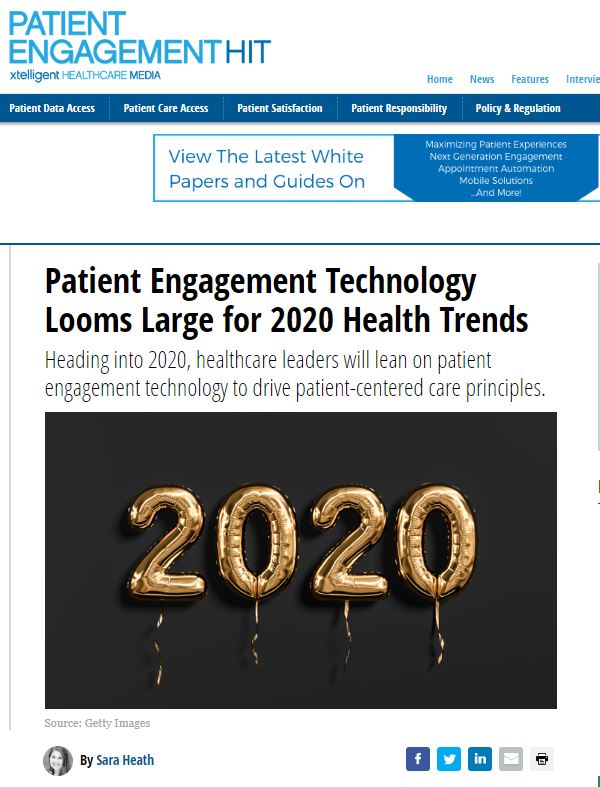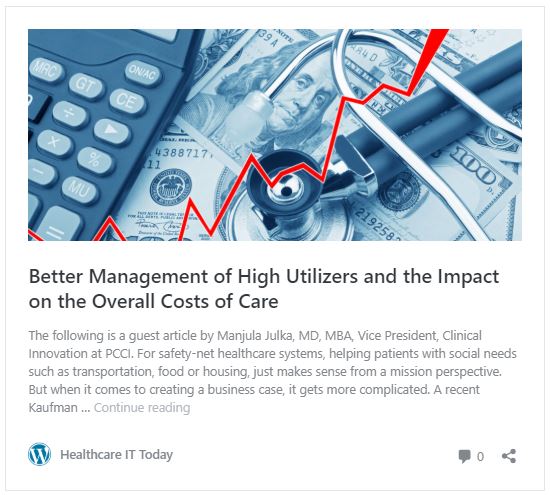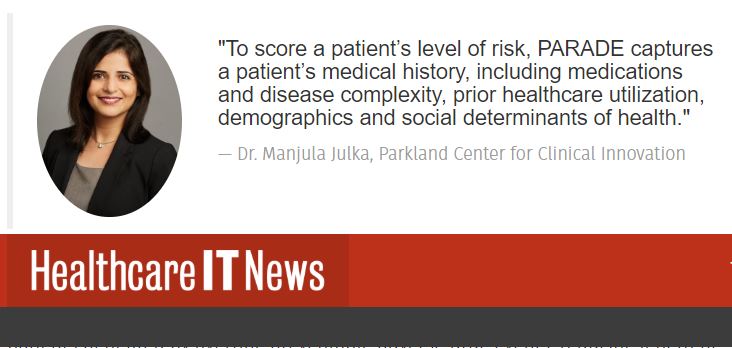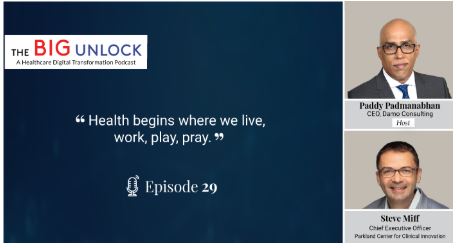By Natasha Goburdhun, MS, MPH, PCCI’s Vice President, Connected Communities of Care
For safety-net healthcare systems, helping patients with social needs such as transportation, food or housing, just makes sense from a mission perspective. But when it comes to creating a business case, it gets more complicated.
A Kaufman Hall survey of CFOs cited cost reduction, managing changing payment models and improving performance management as the top three challenges for health systems. So, while research may show impacts on costs and utilization from interventions that address Non Medical Drivers of Health (NMDOH), some organizations may not be willing to take the risk of investing in strategies that are outside their scope of service and may not show immediate financial returns. But I would argue that the impact of Non Medical Drivers of Health are everywhere in current health system operations and costs.
“High-utilizers”, individuals who suffer from a multitude of chronic diseases and often complex social/economic challenges, require intensive primary care, and frequently have issues with access, often gain the attention of financial and operational leadership, particularly if the organization has value-based contracts or large uninsured populations. In my experience, to truly manage this population requires addressing the upstream issues that are preventing them from leading and maintaining a healthy life.
But with limited resources and time, health systems need to develop a clear strategy by understanding exactly which individuals to treat, and what intervention will best address their healthcare and social needs.
From my experience working with the full channel of care, I believe the critical success factor in developing this strategy is leveraging data science and technology to conduct a comprehensive data analysis of the target population.
-
- Analyze claims, clinical, social and economic data from your community at the individual and block level, to determine what social determinants are most impacting your high-utilizer population, such as lack of transportation, food insecurity etc. Finding key contributing factors and root-cause issues for your target population is critical.
- Test interventions that other health systems have found lead to improved cost savings and health outcomes. Start with issues with available solutions like transportation, referrals to food banks, and housing services.
- Engage external partners to help you execute the intervention, particularly social services and community-based organizations (CBO) that have expertise in addressing social needs, through a collaboration with a comprehensive governance model.
- Measure outcomes and adjust strategies as needed.
Scale your initial interventions to other populations, and/or move to more complex social needs.
SPOTLIGHT ON PATIENT CARE:
While some health systems may not be ready to dive into a NMDOH strategy, but many realize that the cost of social determinants could already be impacting their daily operations:
1. High No-Show Rates in Clinics
Average no show rates in primary care clinics are 19% with specialty clinics rates running higher, with an average cost between $125 to $350 [1]. That can add up over the course of a year to significant revenue loss for health systems. Lack of transportation or access to affordable daycare play a big role in no show rates among other NMDOH. An estimated 3.6 million people missed medical treatment due to transportation issues [2].
While many health systems and health plans have implemented programs with rideshare companies to solve this problem with some success [3]. Targeting the precise patient population that will benefit from rideshare services is critical. In addition to integrating and aligning transportation services for high-need patients, health systems should also explore other emerging technology and non-traditional option to bring services to where residents already are, instead of attempting to find ways to bring them to traditional healthcare access sites. For example, use of telemedicine and digital health as well as deployment of health services in non-traditional settings such as food pantries and or other CBO settings.
2. Unnecessary Emergency Department Utilization for Vulnerable Populations
Dallas has the fifth highest city jail population, and emerging research suggests that underlying social, behavioral and health issues, particularly substance use disorders and mental illness, contribute to incarceration and recidivism, and that treatment, combined with seamless care continuity for individuals when they return to communities, can help prevent both [4]. Parkland Health and hospital system is designated care provider for this vulnerable population in Dallas. While inmates receive healthcare through Parkland Jail Health program, upon release many former inmates end up without support and in the Parkland emergency department (ED) to seek treatment, driving up unnecessary utilization and costs.
To prevent unnecessary ED visits or a return to jail, Parkland and PCCI are developing an intelligent discharge tool and predictive risk score, combining clinical, social (housing, transportation, job training access) and behavioral factors for inmates, to help connect those being released to community resources. We are also digitally the jail health, clinical providers and community providers on one secure technology platform to better generate real-time cross-sector referrals, track utilization and follow-up, and document services. As a result, transition plans for inmates will comprehensively incorporate medical, employment and financial support like resources.
3. Manage Transitions of Care
Hospitals across the country often struggle with providing homeless patients transitional care to post-acute care facility. If an appropriate place cannot be found, many of these patients stay in the hospital longer than necessary, increasing unnecessary inpatient utilization. And there are no signs of this issue abating anytime soon. In California, hospitals discharged homeless patients nearly 100,000 times in 2017, a 28% increase over 2015.
Two different programs in California have sought to mitigate these issues for hospitals and to assist patients with their social needs. In Los Angeles, the National Health Foundation opened a 62-bed facility for discharged hospital patients who needed less intensive medical oversight than a nursing home. At the facilities, patients have access to case managers for assistance with transportation, food and permanent housing. Area hospitals will often reserve beds at the facility for homeless patients, and L.A. Care Health Plan also leases beds there for their members.
In San Jose, Santa Clara Valley Medical Center created a one-year partnership with Skyline Health Center, a local nursing home. Skyline allocates fifteen beds to the hospital for homeless patients or patients who have no one to care for them at home. During the first ten months, 55 patients were sent to Skyline, and 42 were discharged, the majority to long-term housing programs or family members and friends. Of those discharged, only six were readmitted, a low number for this population [5].
 About Natasha Goburdhun
About Natasha Goburdhun
As Vice President, Connected Communities of Care, Goburdhun uses PCCI’s advanced analytics to provide detailed insights on community health and social needs and assists community organizations, payers and providers in developing strategies and impact/equity measures that address the needs of vulnerable populations. She has over 20 years of strategic planning and operations experience in health plan, provider and community-based organization sectors.
[1] https://www.solutionreach.com/blog/which-wins-the-national-average-no-show-rate-or-yours
[2] https://patientengagementhit.com/news/overcoming-transportation-barriers-to-drive-patient-care-access
[3] https://patientengagementhit.com/news/do-rideshare-tools-reduce-transport-barriers-patient-no-shows
[4] Healthcare Plays Vital Role in Reducing Recidivism; EthicsDaily.com; November 2, 2017; https://ethicsdaily.com/report-healthcare-plays-vital-role-in-reducing-recidivism-cms-24443/; accessed July 14, 2019.
[5] https://khn.org/news/finding-homeless-patients-a-place-to-heal/
###

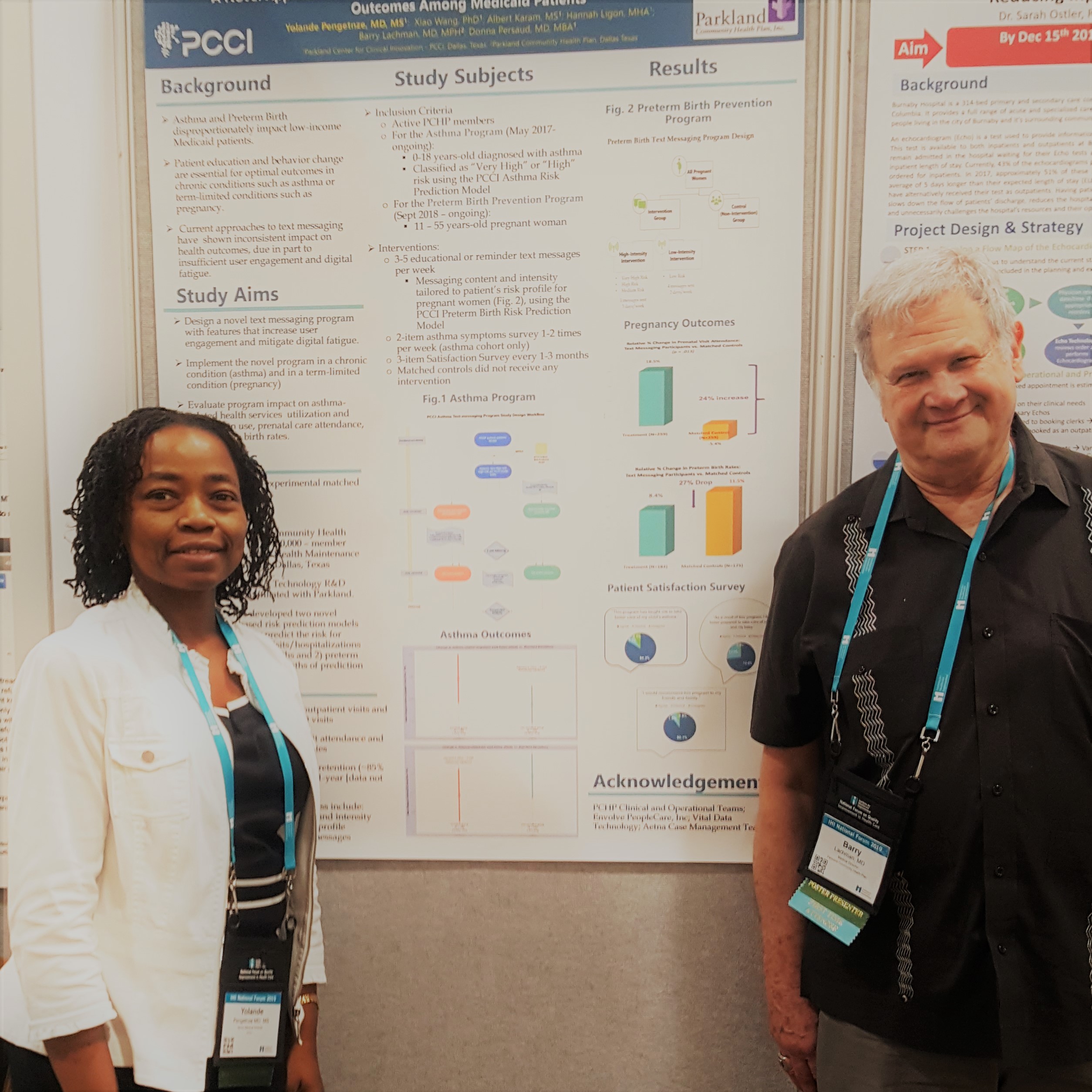




 About
About 